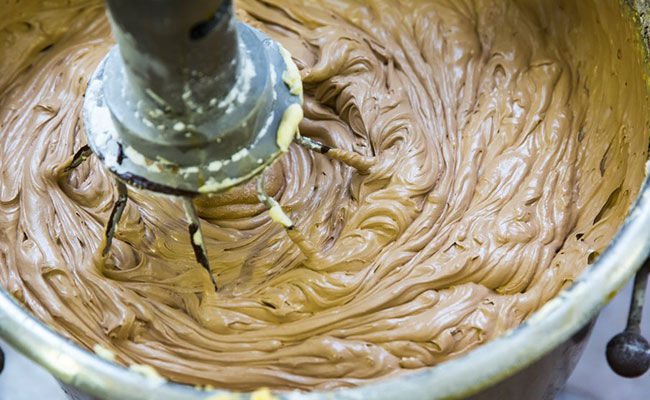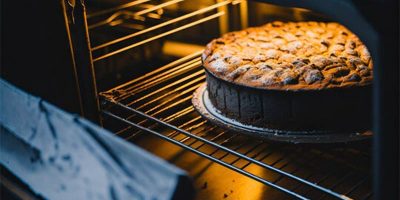Baking a cake is an art, and it is ubiquitous to make mistakes while creating a masterpiece. Not just amateurs but even experienced bakers make mistakes while baking cakes. And just like the masterpiece in art, a mistake in baking can ruin the happiness that cake is meant to provide.
Baking mistakes can result in dry cake, cake sunk in the middle, cake too dense and rubbery, holes in cake, sugary crust, and many more.
Well, among many unwanted and horrified cakes fails, a rubbery cake is also the one that can spoil the mood of indulging the deliciousness.
But why does a cake get rubbery?
If you’ve ever baked a rubbery cake, you know how unpleasant it is to take a bite, and we totally understand the frustration. It may be tempting to beat your batter into oblivion, especially if you see lumps.
The reason why a cake gets rubbery is that the overmixing of flour activates the gluten. It makes cakes hard instead of the lovely soft spongy texture we associate with a good cake. And the over mixing is usually caused from incorrectly creaming butter and sugar.


Gluten is a protein that gives baked goods firm and elastic structure but overdoing it can mean a chewy texture, and that’s no good.
Apart from the Gluten, insufficient creaming of sugar and eggs will also make a tight texture because there isn’t enough air trapped in the mix to give it a lift.
Many of the inexperienced bakers who try to bake mug cakes usually end up baking it rubbery. And then the question speaks in their mind;
Why is my mug cake rubbery!
Well, over mixing the batter and the wrong temperature of the butter can be the reason for a rubbery mug cake just like the normal cakes. But two other reasons for a mug cake being rubbery are ‘use of too much oil’ and ‘overcooking of cake’.
Keep the points in mind and don’t repeat the mistakes that you have made before so that you can enjoy the perfect cake and don’t get to deal with a rubbery cake.
Just as we stated in the starting, baking a cake is an art and creating a masterpiece needs an immense amount of practice.
With time and practice, you will be able to turn yourself into an expert baker from the novice baker.
Tips to Get Perfectly Baked Cake on Your Plate
Baking is not as complicated as it looks and is not as easy as we think. When trying your hands at baking a cake, you should keep little things in your mind to avoid common baking mistakes. Here are a few tips mentioned below to make your baking experience smooth.
- While baking, you need to be very patient; this is the first rule. Allow your oven to preheat appropriately, so your cake gets the proper temperature for baking.
- Give your cake some time to cool in the pan so that it comes out cleanly.
- There are no shortcuts in baking, so you need to bake the cake at the right temperature.
- The choice of suitable baking pans is significant, so always bake your cake in the size of the pan specified.
- Always use fresh ingredients in the proper amount to get the perfect texture of the cake.
- In baking, there is no substitution for ingredients, so make sure that you have all the ingredients in your kitchen to avoid last-minute mishaps.
- Avoid over-mixing of flour as it activates the gluten amount, which makes the cake hard, and as a result, you will get a rubbery cake.
- Always check the freshness of your baking soda and powder, as it plays a very crucial role while baking a cake.
- Proper measurement is the key to getting a perfectly baked cake.
So, next time when you are baking a cake, remember these tips to get a delectable cake.
Capping words
Understanding why your cake turns out rubbery is crucial for every baker, whether you’re a seasoned pro or just starting your baking journey. A rubbery cake can be a result of various factors, from overmixing the batter to incorrect measurements or overbaking. It’s essential to pay close attention to these details to ensure your baked creations come out just the way you want them.
Remember, making adjustments to your baking technique and paying attention to the recipe’s instructions can help you avoid the dreaded rubbery cake syndrome. If you’re a fan of quick and easy desserts, consider trying out a mug cake recipe. These single-serving delights are not only convenient but also have a lower risk of turning rubbery due to their shorter baking time. With a little practice and attention to detail, you’ll be baking perfect, moist cakes in no time, leaving rubbery cakes in the past. Happy baking!
Every now and then, order cake online from a renowned bakery so that you can taste it and try to match the yumminess with your baking skills.





